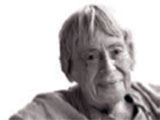
In the sense that it offers a glimpse of some imagined alternative to “the way we live now,” much of my fiction can be called utopian, but I continue to resist the word. Many of my invented societies strike me as an improvement in one way or another on our own, but I find utopia far too grand and rigid a name for them. Utopia, and dystopia, are intellectual places. I write from passion and playfulness. My stories are neither dire warnings nor blueprints for what we ought to do. Most of them, I think, are comedies of human manners, reminders of the infinite variety of ways in which we always come back to pretty much the same place, and celebrations of that infinite variety by the invention of still more alternatives and possibilities. Even in the novels The Dispossessed and Always Coming Home, in which I worked out more methodically than usual certain variations on the uses of power, which I preferred to those that obtain in our world—even these are as much efforts to subvert as to display the ideal of an attainable social plan which would end injustice and equality once and for all.
To me the important thing is not to offer any specific hope of betterment but, by offering an imagined but persuasive alternative reality, to dislodge my mind, and so the reader’s mind, from the lazy, timorous habit of thinking that the way we live now is the only way people can live. It is that inertia that allows the institutions of injustice to continue unquestioned.